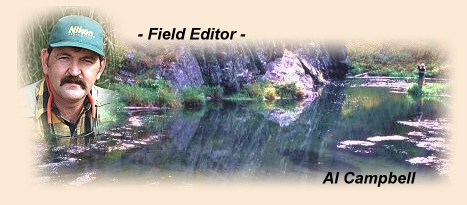|
Last week a young boy asked me why I fish with flies. I told
him I enjoyed flyfishing more than the other types of fishing.
Then he asked why. I told him it was more challenging. I
asked him if he had tried flyfishing. He said no. I asked
why. He said it was too hard. We danced around like that
for a few minutes until I noticed the way he was dressed.
The boy was wearing a baseball outfit and was obviously a member
of a team. I asked him if he thought baseball was too hard for
him to learn. He said no; it wasn't too hard. I asked if he
hit a homerun the first time he tried to hit a baseball. The
answer was obvious; no, he didn't. We started talking about
how hard it was to learn how to hit the ball, but also how
rewarding it is when you do hit the ball. In fact, he agreed
that everything associated with baseball takes practice; and
a lot of plays had to be learned before he could play the
game right.
That's when I dropped a bombshell on him. Flyfishing is like
baseball. You have to learn a few things like casting that
require hand-eye coordination. You need to learn a few plays
to be very successful at the game. Nobody picks up a fly rod
and casts well the first time out. Both sports require practice
and a certain type of learned coordination. Both sports are
challenging, but the rewards are great.
I've been chasing fish with a fly rod for more than 38 years.
I didn't start out in a pretty way. My casting lacked, well,
everything. I knew nothing about the insects, how they lived,
how they hatched or what their names were. I tied knots I'm
sure I couldn't duplicate today, and most of them failed.
I did just about everything wrong, but I still caught fish
once in a while.
As time went on, I learned. With practice, I became fairly
capable in the casting skills department. I didn't hit a lot
of home runs; but I hit fairly regularly, and some of those
hits were homeruns. I learned the plays of the game; places
where fish feed and hide, a general knowledge of the insects,
what flies matched those insects and the most useful knots.
I didn't learn all there is to know, but I learned enough
to have consistent winning seasons.
I still don't know the names of all the insects. Just when
I thought I had a fair grip on the Latin names of the insects
most common to my region, some group of bug guys renamed and
re-classified them. It doesn't matter all that much; I can
still identify size, major species and color; and from there,
I can match the hatch with a fly that fits that description.
Who cares if I don't remember the new name for what was called
a pseudocloeon emundsi a few years ago? I can
still find fly patterns to match that small mayfly with gray
wings and an olive/yellow body, and that's what counts if
you want to catch fish.
We all have our learned skills, and some of us are better at
certain aspects of this sport than others. Some guys cast
better than others. Some guys tie better flies, and some
guys are knot wizards. You have strong points and weak points.
Concentrate on both areas; the strong to keep them strong and
the weak to strengthen them. Eventually it all becomes a
coordinated response and you become successful in areas that
once were points of failure.
Just like a baseball player, you need to practice to hit the
ball consistently. You can't expect to hit a fast ball the
first time to the plate, but in time and with practice, you
can expect to hit the ball regularly. Flyfishing isn't hard;
it's just a matter of practice and learning the plays.
~ AC
|



